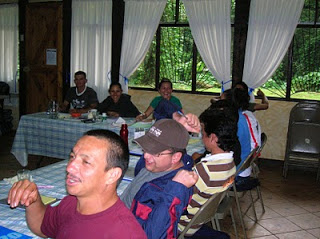So while all the summer course students return home, with awesome tans, to share photos and stories of their adventures in Costa Rica, and fall students start enthusiastically packing for their upcoming semester and adult courses, CRROBS instructors are not so lucky. They are spending 9 straight days, from August 18-26, getting their Wilderness First Responder (WFR) and Emergency Response Certifications (ERC), here at Base.
Wilderness First Responder, also known as the WFR, is a certification combining the Emergency Response Certification (ERC) with additional hours of curriculum and practical tests in a wilderness setting. The ERC (a 48-hour DOT course certification) is required for police, athletic trainers and firemen in the USA, and it is administered by the American Red Cross (ARC). Due to the remote nature of our courses, our lead field staff are required to have successfully completed the entire WFR and ERC course, every 3 years, as per ARC standards.
At CRROBS, this course lasts nine days– filled with in-class instruction; case studies; patient care stations; skills assessment; and most importantly, “practical” scenarios and drills. For a complete break-down of the curriculum, please visit this link.
However, this year, we added a few more classes, to the traditional WFR/ERC certification curriculum, to better address our students’ needs and well-being. For example, one of Outward Bound Costa Rica’s core values is social and environmental responsibility. Therefore, All CRROBS instructors attended a lecture, by environmental educator and activist, Federico Solorzano, of Planet Conservation (more about this coming soon!) about to be more eco-sensitive on course, at home and at work.
We also invited Dr. Steven Kogel Hughes, who has been practicing Psychiatry and addiction medicine since 1982, and is the current resident Psychiatrist at Tropical Oasis, to educate all CRROBS staff on mental health issues, diseases, and both natural and pharmaceutical treatments from everything from Attention Deficiency Disorder to Depression to substance abuse issues. These two new classes seek to better prepare all our staff for the general well-being of staff, students and the environment.

